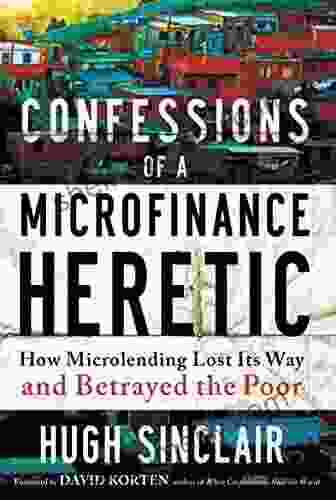How Microlending Lost Its Way and Betrayed the Poor

Microlending, the practice of lending small amounts of money to poor people in developing countries, has been hailed as a way to alleviate poverty. By providing access to capital, microlenders argue, the poor can start businesses, invest in education, and improve their lives. However, a growing body of evidence suggests that microlending has failed to live up to its promise. In fact, some critics argue that it has actually made poverty worse.
4.4 out of 5
| Language | : | English |
| File size | : | 3189 KB |
| Text-to-Speech | : | Enabled |
| Screen Reader | : | Supported |
| Enhanced typesetting | : | Enabled |
| Word Wise | : | Enabled |
| Lending | : | Enabled |
| Print length | : | 289 pages |
One of the biggest problems with microlending is that it is often too expensive. Interest rates on microlending loans can range from 20% to 50%, which is much higher than the interest rates charged by traditional banks. This makes it difficult for borrowers to repay their loans, and can lead to a cycle of debt.
In addition to high interest rates, microlenders often use predatory practices to collect debts. These practices can include harassment, intimidation, and even violence. This can make it impossible for borrowers to escape poverty, and can lead to further hardship.
The failures of microlending have led to calls for reform. Some critics argue that microlending should be regulated more strictly, while others argue that it should be abolished altogether. However, there is no easy solution to the problem of microlending. Microlending can be a valuable tool for reducing poverty, but it must be used responsibly. Until microlenders are held accountable for their actions, and until interest rates are lowered, microlending will continue to betray the poor.
The History of Microlending
Microlending has its roots in the 1970s, when Muhammad Yunus, a Bangladeshi economist, founded the Grameen Bank. Yunus believed that the poor could be empowered by providing them with access to capital. He started the Grameen Bank by lending small amounts of money to poor women in rural Bangladesh. The Grameen Bank was a success, and Yunus was awarded the Nobel Peace Prize in 2006 for his work.
The Grameen Bank's success inspired other organizations to start microlending programs. By the early 2000s, microlending had become a global phenomenon. Microlenders were operating in over 100 countries, and they were lending billions of dollars to poor people.
The Failures of Microlending
Despite its initial success, microlending has come under increasing criticism in recent years. Critics argue that microlending has failed to live up to its promise of reducing poverty. In fact, some studies have shown that microlending can actually make poverty worse.
One of the biggest problems with microlending is that it is often too expensive. Interest rates on microlending loans can range from 20% to 50%, which is much higher than the interest rates charged by traditional banks. This makes it difficult for borrowers to repay their loans, and can lead to a cycle of debt.
In addition to high interest rates, microlenders often use predatory practices to collect debts. These practices can include harassment, intimidation, and even violence. This can make it impossible for borrowers to escape poverty, and can lead to further hardship.
The failures of microlending have led to calls for reform. Some critics argue that microlending should be regulated more strictly, while others argue that it should be abolished altogether. However, there is no easy solution to the problem of microlending. Microlending can be a valuable tool for reducing poverty, but it must be used responsibly. Until microlenders are held accountable for their actions, and until interest rates are lowered, microlending will continue to betray the poor.
The Future of Microlending
Microlending is at a crossroads. It can either continue on its current path, which is likely to lead to further failures, or it can be reformed to become a more effective tool for reducing poverty.
There are a number of reforms that could be made to microlending. These include:
- Regulating microlenders more strictly
- Lowering interest rates
- Prohibiting predatory practices
These reforms would make microlending more sustainable and more effective at reducing poverty. However, they will only be effective if they are implemented and enforced by governments and microlenders.
The future of microlending is uncertain. However, there is hope that it can be reformed to become a more effective tool for reducing poverty. By holding microlenders accountable for their actions, lowering interest rates, and prohibiting predatory practices, we can ensure that microlending is used to help the poor, not betray them.
4.4 out of 5
| Language | : | English |
| File size | : | 3189 KB |
| Text-to-Speech | : | Enabled |
| Screen Reader | : | Supported |
| Enhanced typesetting | : | Enabled |
| Word Wise | : | Enabled |
| Lending | : | Enabled |
| Print length | : | 289 pages |
Do you want to contribute by writing guest posts on this blog?
Please contact us and send us a resume of previous articles that you have written.
 Book
Book Novel
Novel Page
Page Chapter
Chapter Text
Text Story
Story Genre
Genre Reader
Reader Library
Library Paperback
Paperback E-book
E-book Magazine
Magazine Newspaper
Newspaper Paragraph
Paragraph Sentence
Sentence Bookmark
Bookmark Shelf
Shelf Glossary
Glossary Bibliography
Bibliography Foreword
Foreword Preface
Preface Synopsis
Synopsis Annotation
Annotation Footnote
Footnote Manuscript
Manuscript Scroll
Scroll Codex
Codex Tome
Tome Bestseller
Bestseller Classics
Classics Library card
Library card Narrative
Narrative Biography
Biography Autobiography
Autobiography Memoir
Memoir Reference
Reference Encyclopedia
Encyclopedia Hugh Walker
Hugh Walker Herb Cohen
Herb Cohen Helen Macdonald
Helen Macdonald Havilah Babcock
Havilah Babcock Tim Calkins
Tim Calkins Richelle Putnam
Richelle Putnam Muhammad Ali
Muhammad Ali Heather D Yates
Heather D Yates Hazel Rowley
Hazel Rowley Maria Adolfsson
Maria Adolfsson Ina May Gaskin
Ina May Gaskin Richard Mabey
Richard Mabey Lucas Peters
Lucas Peters Heather Lehr Wagner
Heather Lehr Wagner Lynne Porter
Lynne Porter Jerry Israel
Jerry Israel Jeffrey Chipps Smith
Jeffrey Chipps Smith Ryosuke Fuji
Ryosuke Fuji Yasmin Akhtar
Yasmin Akhtar Heda Margolius Kovaly
Heda Margolius Kovaly
Light bulbAdvertise smarter! Our strategic ad space ensures maximum exposure. Reserve your spot today!

 David Foster WallaceWhen the Brain Can Hear: Unlocking the Secrets of Auditory Perception
David Foster WallaceWhen the Brain Can Hear: Unlocking the Secrets of Auditory Perception Albert CamusFollow ·3.7k
Albert CamusFollow ·3.7k Colin FosterFollow ·18.1k
Colin FosterFollow ·18.1k Leon FosterFollow ·3.9k
Leon FosterFollow ·3.9k George MartinFollow ·16.1k
George MartinFollow ·16.1k Jeff FosterFollow ·2.2k
Jeff FosterFollow ·2.2k Levi PowellFollow ·16.9k
Levi PowellFollow ·16.9k Mario BenedettiFollow ·14.4k
Mario BenedettiFollow ·14.4k Mario SimmonsFollow ·13.4k
Mario SimmonsFollow ·13.4k

 Bo Cox
Bo CoxUncover the Enchanting Pearl of the Arabian Gulf: Insight...
Escape to the opulent...

 Michael Crichton
Michael CrichtonInsight Guides Pocket Baku Travel Guide Ebook: Your...
An Enchanting Journey...

 Eugene Scott
Eugene ScottLearn to Paint Scenic Scenes: Unveil the Secrets of...
Step into the...

 Benji Powell
Benji PowellEmbark on a Culinary Adventure with "The Ultimate Sichuan...
Sichuan cuisine,...

 Finn Cox
Finn CoxDiscover the Enchanting World of Art Nouveau: A...
Immerse yourself in the captivating beauty...

 Corey Green
Corey GreenUncover the Vibrant World of Guatemalan Chicken Buses: An...
Step into a world of vibrant colors,...
4.4 out of 5
| Language | : | English |
| File size | : | 3189 KB |
| Text-to-Speech | : | Enabled |
| Screen Reader | : | Supported |
| Enhanced typesetting | : | Enabled |
| Word Wise | : | Enabled |
| Lending | : | Enabled |
| Print length | : | 289 pages |










